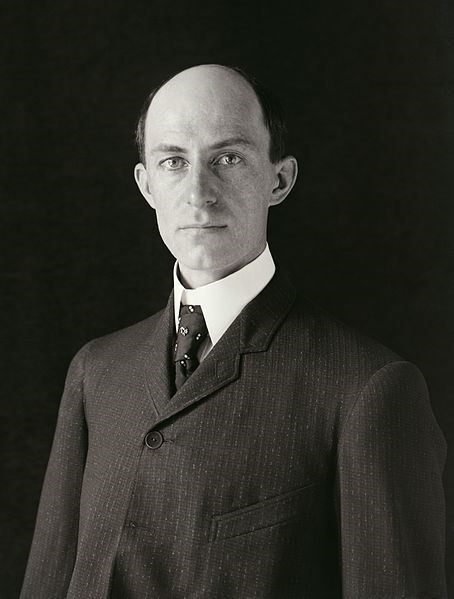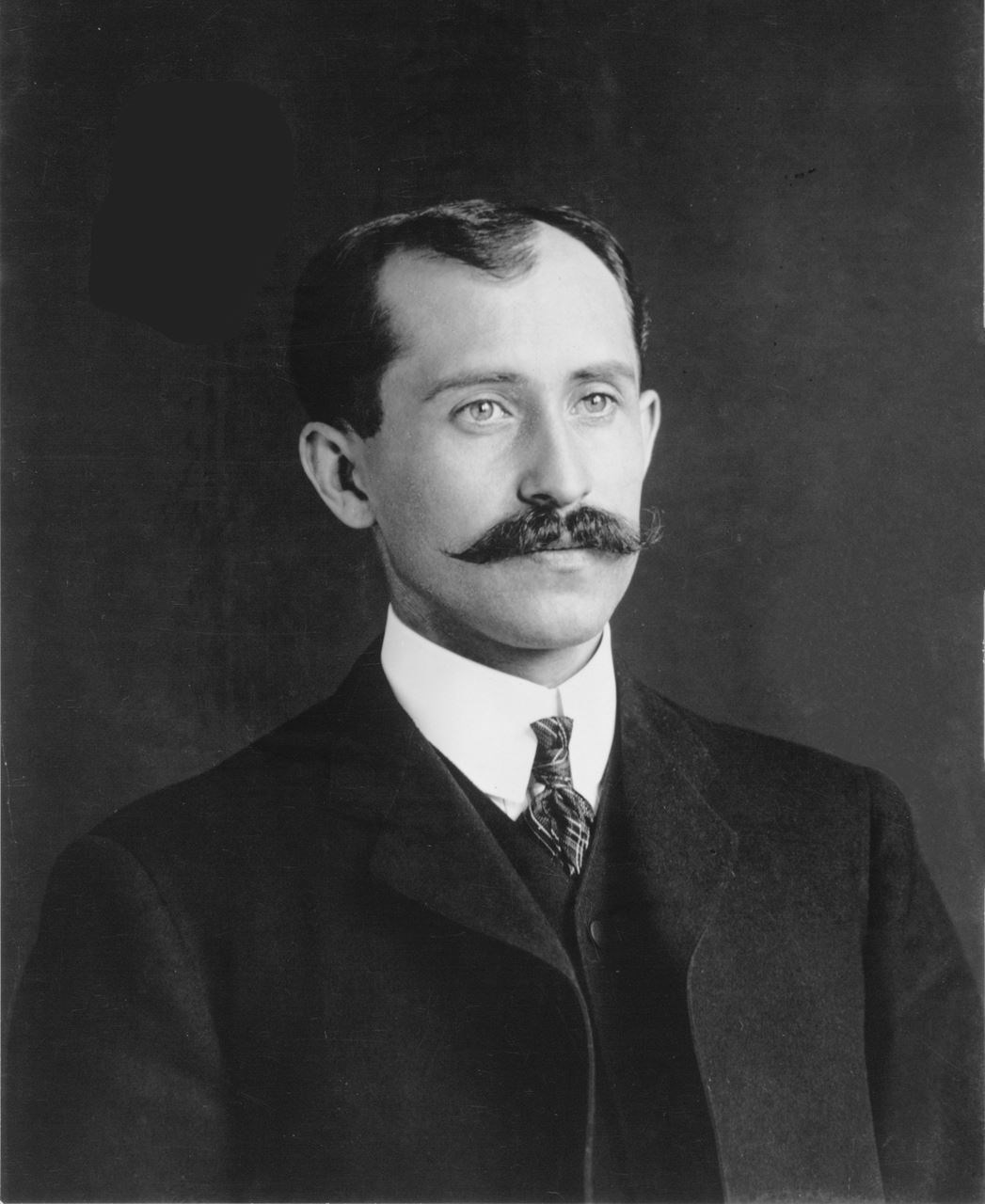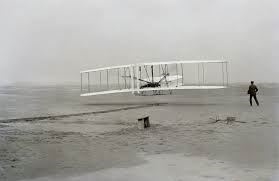“The Wrights created one of the greatest cultural forces since the development of writing, for their invention effectively became the World Wide Web of that era, bringing people, languages, ideas, and values together” (Gates). A hero is someone who dedicates themselves to using their strengths to benefit the world around them. Heroes persevere and work hard regardless of the struggles they face and are thus brave people who selflessly dedicate themselves to helping others. Many people view celebrities or famous people as heroes, when in reality, a person’s traits are what makes them a hero. A true hero’s intention is not to rise above others at all costs, but rather to help others at all costs.
 Wilbur Wrighthttps://commons.wikimedia.org/wiki/File:Wilbur_Wright.jpg
Wilbur Wrighthttps://commons.wikimedia.org/wiki/File:Wilbur_Wright.jpg Orville Wright https://commons.wikimedia.org/wiki/File:Orville_Wright.jpgThe Wright brothers, Wilbur and Orville Wright, are best known for their invention of the world’s first plane. Wilbur Wright was born in Millville, Indiana on April 16, 1867, and his younger brother Orville Wright was born in Dayton, Ohio on August 19, 1871. The Wright brothers received education up until high school and did not attend college. In 1892, they opened a bicycle shop where they sold and repaired bicycles. Their shop was very successful— the brothers managed to sell their own printing press and were making their own improved bicycles within three years of opening. The Wright brothers’ bicycle shop was the beginning of their hobby of making and building things. The Wright brothers later admitted that a toy helicopter they were given in their youth is what sparked their interest in flight. The bravery, hard work, and persistence of the Wright brothers enabled them to build the world’s first plane, which has benefited millions of people for years in a multitude of ways, thus making them heroes of the human race.
Orville Wright https://commons.wikimedia.org/wiki/File:Orville_Wright.jpgThe Wright brothers, Wilbur and Orville Wright, are best known for their invention of the world’s first plane. Wilbur Wright was born in Millville, Indiana on April 16, 1867, and his younger brother Orville Wright was born in Dayton, Ohio on August 19, 1871. The Wright brothers received education up until high school and did not attend college. In 1892, they opened a bicycle shop where they sold and repaired bicycles. Their shop was very successful— the brothers managed to sell their own printing press and were making their own improved bicycles within three years of opening. The Wright brothers’ bicycle shop was the beginning of their hobby of making and building things. The Wright brothers later admitted that a toy helicopter they were given in their youth is what sparked their interest in flight. The bravery, hard work, and persistence of the Wright brothers enabled them to build the world’s first plane, which has benefited millions of people for years in a multitude of ways, thus making them heroes of the human race.
The Wright brothers showed bravery in their decision to build and test airplanes despite the risks. For a hero to be brave, they are not afraid of what could happen to them in dangerous situations and are willing to sacrifice themselves to help others. In the beginning of the Wright brothers’ journey to make planes, they admired the work of a German man named Otto Lilienthal. The Wright brothers were not afraid to build and test planes even after learning of Otto Lilienthal's death in a glider accident: “By the mid-1890s, the Wright brothers were closely following the successful experiments of the German Otto Lilienthal with gliders, only to be stunned by news of his death in a gliding mishap in 1896. The tragedy, however, served as a catalyst for both men, who thereupon embarked on a common quest to solve the problem of manned flight” (“Wilbur and Orville Wright”). Otto Lilienthal’s death by a gliding accident in 1896 showed the Wright brothers that building and testing flying devices were dangerous. Despite the fact that the Wright brothers knew they could die, they continued to test their planes. This shows that they are brave because even though the possibility of death was overwhelming, the Wright brothers did not let it stop them. Furthermore, when giving examples of failed flying machine trials done by those before them, McCullough explains the effect they had on the Wright brothers: “In no way did any of this discourage or deter Wilbur and Orville Wright, any more than the fact that they had had no college education, no formal technical training, no experience working with anyone other than themselves, no friends in high places, no financial backers, no government subsidies, and little money of their own. Or the entirely real possibility that at some point, like Otto Lilienthal, they could be killed” (McCullough 35). Risking their financial stability could result in a multitude of problems in one’s life, and the Wright brothers’ lack of college education made it riskier and more challenging for them to build planes. However, the Wright brothers were brave because they still built planes even though they knew it was risky and would not be easily accomplished. The Wright brothers’ bravery in taking risks to build their planes showed that they truly wanted to accomplish something that would result in the benefit of others, thus making them heroes. The bravery of the Wright brothers makes them heroes as they built and tested planes even when they knew of the apparent risks.
The hard work of the Wright brothers was heroic because without it, they would not have succeeded and would not have gone on to benefit others with their invention of the plane. The Wright brothers did not have education beyond high school but were able to build the world’s first successful plane by repeatedly studying, building, testing, and learning from their test flights. Unlike others who tested planes before them, the Wright brothers did not go to college: “Wilbur and Orville were born in Indiana and Ohio, respectively; neither sought education beyond high school, though both showed an aptitude for mechanics and independent study from an early age” (“The Wright Brothers”). A college education equips one with the skills and knowledge to accomplish tasks that those without one might struggle with. Because the Wright brothers did not have a college education, building a successful plane would be harder for them than it would be for those with one. Despite this disadvantage, the Wright brothers were able to build the world’s first plane due to their hard work. Their hard work and success prove that the Wright brothers are heroes as they worked hard to benefit others. In David McCullough’s The Wright Brothers, McCullough described the thoughts of John T. Daniels, a man who knew the Wright brothers and photographed their first successful flight: “Others as well had come to see them as more than mere eccentrics. Life on the Outer Banks was harsh. Making ends meet was a constant struggle. Hard workers were greatly admired and in the words of John T. Daniels, the Wrights were ‘two of the workingest boys’ ever seen, ‘and when they worked, they worked . . . They had their whole heart and soul in what they were doing’” (McCullough 54). The dedication and hard work that the Wright brothers put into their planes shows that they truly wanted to accomplish something that would benefit others. Because the Wright brothers cared about what they did and worked so hard, they were able to succeed, thus making them deserving heroes as the product of their toil, the plane, has benefited people for years. The Wright brothers’ hard work was able to make up for their lack of college education and enabled them to eventually surpass those before them.
The Wright brothers showed their persistence by continuing to make planes over the course of many years. Persistence is when one continually tries to solve a problem, even when the results may not be successful. After each plane was tested, the Wright brothers continued to make improvements to their planes: “To test their theories, the Wrights traveled to Kitty Hawk, North Carolina, an ideal site for wind and terrain. Following experiments with a biplane kite, they built several gliders, each more sophisticated than its predecessor” (“The Wright Brothers”). The fact that the Wright brothers made improvements to their new planes shows persistence because even if the plane was not successful, the Wright brothers simply tried to improve the next model and did not get discouraged. When one does not get their desired results, it is easy to give up. However, the Wright brothers did not give up and continued to make planes, eventually allowing them to succeed and benefit others with their planes. After their patents were granted in 1906, the Wright brothers tried to sell their model but were unsuccessful in the beginning: “They were frustrated in their attempts to sell it to the United States or foreign governments; only in 1908 did their success become known. That summer, Orville dazzled United States Army observers at Fort Myer, Virginia, while Wilbur did the same in France for European observers. The effect was electric, and aviation enthusiasts now adopted the Wright method of aerodynamical control” (“Wilbur and Orville Wright”). Due to the Wright brothers’ persistence, their airplane and ways of flying were accepted, which opened up the doors to the exploration of aviation. Because the way the Wright brothers flew was not accepted at first, they proved their persistence by not giving up until they got their desired results. If the Wright brothers did not continue building planes until they succeeded, airplanes would not be where they are today and they would not be considered deserving heroes.
 The Wright Brothers' First Flighthttps://en.wikipedia.org/wiki/File:First_flight2.jpgIn conclusion, the Wright brothers were heroes because of their bravery, hard work, and persistence, which they used to build planes. The Wright brothers were brave, as they were not afraid to build planes even though the task was dangerous and they lacked a college education and financial backing. In order to achieve success, the Wright brothers worked very hard and persevered over the course of many years. In the end, their hard work and persistence paid off, and they were able to create the world’s first successful plane. The Wright brothers’ planes benefit people in many ways and revolutionized communication and transportation by bringing people and cultures together. This also allows cultures to expand and share their ways, ultimately benefiting people of all different backgrounds. The Wright brothers’ work inspires many, including myself, as they were able to accomplish what those before them could not, regardless of some of their shortcomings. Personally, the Wright brothers inspire me to be brave and continually work hard because they proved that with bravery and consistent effort, one can succeed, become a hero, and help others. Regardless of the fact that the Wright brothers did not go to college, they were still able to build the world’s first plane, which showed me that one’s work ethic can help them achieve. This inspires me daily to try my best and strive to improve every day. Without the Wright brothers, the airplane— something so impactful for the human race, might not exist today.
The Wright Brothers' First Flighthttps://en.wikipedia.org/wiki/File:First_flight2.jpgIn conclusion, the Wright brothers were heroes because of their bravery, hard work, and persistence, which they used to build planes. The Wright brothers were brave, as they were not afraid to build planes even though the task was dangerous and they lacked a college education and financial backing. In order to achieve success, the Wright brothers worked very hard and persevered over the course of many years. In the end, their hard work and persistence paid off, and they were able to create the world’s first successful plane. The Wright brothers’ planes benefit people in many ways and revolutionized communication and transportation by bringing people and cultures together. This also allows cultures to expand and share their ways, ultimately benefiting people of all different backgrounds. The Wright brothers’ work inspires many, including myself, as they were able to accomplish what those before them could not, regardless of some of their shortcomings. Personally, the Wright brothers inspire me to be brave and continually work hard because they proved that with bravery and consistent effort, one can succeed, become a hero, and help others. Regardless of the fact that the Wright brothers did not go to college, they were still able to build the world’s first plane, which showed me that one’s work ethic can help them achieve. This inspires me daily to try my best and strive to improve every day. Without the Wright brothers, the airplane— something so impactful for the human race, might not exist today.
Works Cited
Gates, Bill. “Aviators: THE WRIGHT BROTHERS.” Time, Time Inc., 29 Mar. 1999, content.time.com/time/subscriber/article/0,33009,990611-3,00.html.
McCullough, David. The Wright Brothers. Simon & Schuster, 2015.
"The Wright Brothers." World of Invention, Gale, 2006. Student Resources In Context, https://link.galegroup.com/apps/doc/K1647000382/SUIC?u=powa9245&sid=SUIC&xid=10a09e83. Accessed 2 Apr. 2019.
"Wilbur and Orville Wright." DISCovering U.S. History, Gale, 1997. Student Resources In Context, https://link.galegroup.com/apps/doc/BT2104100874/SUIC?u=powa9245&sid=SUIC&xid=70da0ace. Accessed 2 Apr. 2019.
Works Consulted
“Diaries and Notebooks: 1903, Orville Wright.” The Library of Congress, www.loc.gov/item/wright002238.
Gates, Bill. “Aviators: THE WRIGHT BROTHERS.” Time, Time Inc., 29 Mar. 1999, content.time.com/time/subscriber/article/0,33009,990611-3,00.html. Accessed 15 Apr. 2019.
McCullough, David. The Wright Brothers. Simon & Schuster, 2015.
“The Wright Brothers - First Flight.” Biography.com, A&E Networks Television, 4 Mar. 2017, www.biography.com/video/the-wright-brothers-first-flight-12887619856. Accessed 2 Apr. 2019.
"The Wright Brothers." World of Invention, Gale, 2006. Student Resources In Context, https://link.galegroup.com/apps/doc/K1647000382/SUIC?u=powa9245&sid=SUIC&xid=10a09e83. Accessed 2 Apr. 2019.
"Wilbur and Orville Wright." DISCovering U.S. History, Gale, 1997. Student Resources In Context, https://link.galegroup.com/apps/doc/BT2104100874/SUIC?u=powa9245&sid=SUIC&xid=70da0ace. Accessed 2 Apr. 2019.
Page created on 6/3/2019 3:37:13 AM
Last edited 10/27/2024 4:50:26 PM
